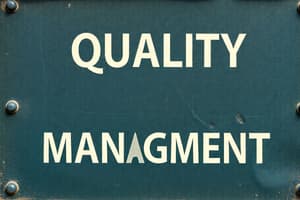Podcast
Questions and Answers
What does ISO 9000 define quality management as?
What does ISO 9000 define quality management as?
- Coordinated activities to direct and control an organization with regard to finance.
- Coordinated activities to direct and control an organization with regard to quality. (correct)
- Coordinated activities to direct and control an organization with regard to marketing.
- Coordinated activities to direct and control an organization with regard to customer satisfaction.
Who developed the statistical process control method in the 1920s?
Who developed the statistical process control method in the 1920s?
- Walter A. Shewhart (correct)
- Arman Feigenbaum
- Genichi Taguchi
- Kaoru Ishikawa
Which of the following ISO standards is specific to medical laboratories?
Which of the following ISO standards is specific to medical laboratories?
- ISO 14001:2015
- ISO 15189:2007 (correct)
- ISO/IEC 17025:2005
- ISO 9001:2000
In what decade were quality control methods first applied in laboratories?
In what decade were quality control methods first applied in laboratories?
Which thinker contributed to the concepts of quality management alongside Shewhart?
Which thinker contributed to the concepts of quality management alongside Shewhart?
What is one critical aspect of quality management mentioned in the content?
What is one critical aspect of quality management mentioned in the content?
Which of the following organizations is involved in establishing laboratory standards?
Which of the following organizations is involved in establishing laboratory standards?
What did Galvin's work focus on in the context of quality management?
What did Galvin's work focus on in the context of quality management?
Which ISO standard addresses general quality management system requirements applicable to laboratories?
Which ISO standard addresses general quality management system requirements applicable to laboratories?
What aspect of quality management became necessary as per the new concepts introduced?
What aspect of quality management became necessary as per the new concepts introduced?
What is the primary purpose of the Clinical and Laboratory Standards Institute (CLSI)?
What is the primary purpose of the Clinical and Laboratory Standards Institute (CLSI)?
Which document is a guideline created by CLSI related to Health Care?
Which document is a guideline created by CLSI related to Health Care?
How many quality system essentials (QSE) is the CLSI quality management system model based on?
How many quality system essentials (QSE) is the CLSI quality management system model based on?
What does CLSI's quality management system model aim to be compatible with?
What does CLSI's quality management system model aim to be compatible with?
What is the former name of the Clinical and Laboratory Standards Institute (CLSI)?
What is the former name of the Clinical and Laboratory Standards Institute (CLSI)?
Which of the following statements best reflects the role of CLSI?
Which of the following statements best reflects the role of CLSI?
Which organization has established standards for specific programs and areas in laboratories?
Which organization has established standards for specific programs and areas in laboratories?
Which document specifies the application of a quality management system model for laboratory services?
Which document specifies the application of a quality management system model for laboratory services?
Many countries have established what type of standards related to laboratory practices?
Many countries have established what type of standards related to laboratory practices?
What is the significance of the CLSI quality management system model in laboratory training?
What is the significance of the CLSI quality management system model in laboratory training?
Study Notes
Definition of Quality Management
- Quality management involves coordinated activities for directing and controlling an organization concerning quality.
- A quality system comprises the organizational structure, resources, processes, and procedures required to implement quality management.
Historical Development
- Quality management concepts originated in the 20th century, primarily stemming from manufacturing and shop processes.
- Early quality management focused on product quality control, with significant contributions from various thinkers.
Key Innovators and Contributions
- Walter Shewhart introduced statistical process control methods in the 1920s, foundational for laboratory quality control procedures.
- Quality control techniques were not utilized in laboratories until the 1940s.
- Other notable contributors include:
- Arman Feigenbaum
- Kaoru Ishikawa
- Genichi Taguchi
- Galvin, who focused on micro-scale error reduction in laboratories.
International Laboratory Standards
- Quality management includes assessment and measuring performance against established standards or benchmarks.
- The establishment of international laboratory standards became necessary for improved quality management.
- The International Organization for Standardization (ISO) developed standards, beginning with U.S. military standards for equipment manufacturing.
Important ISO Standards
- ISO 9000 documents provide guidance for quality in manufacturing and service sectors, applicable across various organizations.
- ISO 9001:2000 outlines requirements for general quality management systems, including laboratories.
- Specific ISO standards for laboratories include:
- ISO 15189:2007 - Requirements for quality and competence in medical laboratories.
- ISO/IEC 17025:2005 - General requirements for the competence of testing and calibration laboratories.
Role of Clinical and Laboratory Standards Institute (CLSI)
- CLSI, previously known as the National Committee for Clinical Laboratory Standards (NCCLS), plays a vital role in developing laboratory standards.
- CLSI utilizes a consensus process that includes multiple stakeholders to create standards.
- Important CLSI documents include:
- Quality Management System Model for Health Care; Approved Guideline—Second Edition.
- Application of a Quality Management System Model for Laboratory Services; Approved Guideline—Third Edition.
National and Other Laboratory Standards
- Many countries have implemented national laboratory quality standards applicable to their specific contexts.
- Certain standards may be limited to specific laboratory areas or tests.
- The World Health Organization has also set standards for various specialized programs and areas within laboratories.
Studying That Suits You
Use AI to generate personalized quizzes and flashcards to suit your learning preferences.
Description
This quiz explores the definition, historical development, and key contributors to quality management. It highlights important innovators and the evolution of quality management practices, particularly in manufacturing and laboratories. Test your knowledge on this essential topic in organizational quality control.




